Request a Free Assessment

Behavior Training vs. Obedience Training for Dogs
If you are in the market for dog training, you may run across a few terms like "behavior training" or "obedience training." But what's the difference between the two? And which one is best for your dog?
Here at Dog Training Elite Dallas Fort Worth (DFW), we have been in the dog training business for over 40 years, so we can explain the difference between behavior and obedience training for dogs. We'll also help you determine which is right for you and your four-legged best friend. If you are interested in hearing more about Dog Training Elite training programs, call us today for a free in-home consultation!
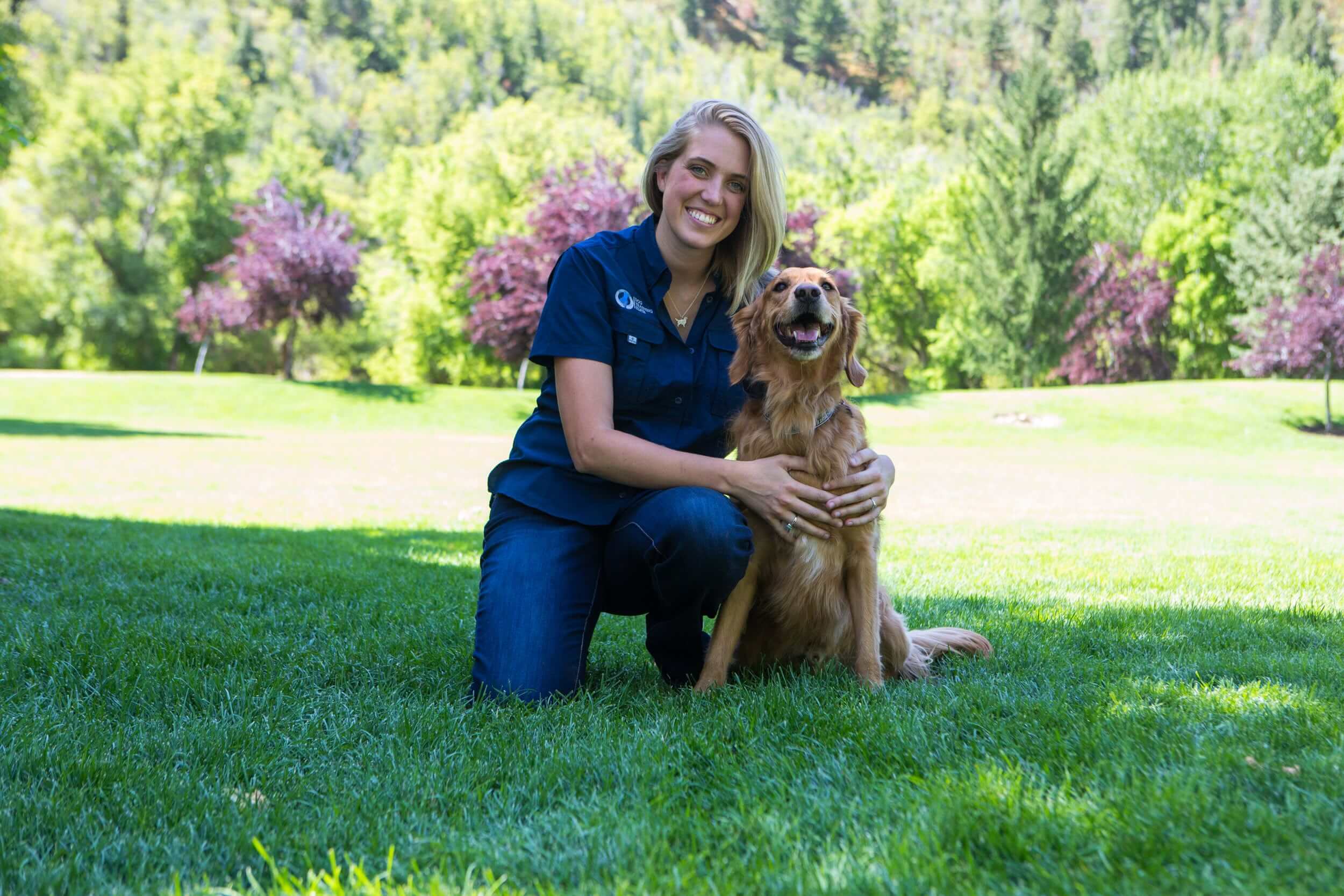
Not all training packages may be available at our Dog Training Elite Dallas—Fort Worth location, please reference our pricing page for complete information on services offered.
Silver
$1,395
- In-Home Training SessionsOne-on-one & personalized 4 Sessions
- Group Park Training Sessions 4 Weeks
- Come
- Heel(walk with you without pulling)
- Sit(next to you & off leash at a distance)
- Off(furniture, if desired)
- Quiet(stop excessive barking & whining)
- Place(go to bed)
Gold
$2,395
- In-Home Training SessionsOne-on-one & personalized 6 Sessions
- Group Park Training Sessions 6 Months
- Come
- Heel(walk with you without pulling)
- Sit(next to you & off leash at a distance)
- Off(furniture if desired)
- Quiet(stop excessive barking & whining)
- Place(go to bed)
- Down(next to you & off leash at a distance)
- Housebreaking / Potty Training
- Build Confidence
- Off-leash Obedience
- Load into Car or Kennel
- STOP Running Away
- STOP Jumping on People
- STOP Puppy Biting
- STOP Chasing Animals
- STOP Digging
Platinum
$3,645
Platinum offers advanced obedience/behavioral modification with a goal of off-leash control. Includes additional training options and offers more one-on-one and group sessions than Gold.
- In-Home Training SessionsOne-on-one & personalized 8 Sessions
- Group Training SessionsOne-hour sessions Unlimited *see above description
- Come
- Place(go to bed)
- Heel(walk with you without pulling)
- Sit(next to you & off leash at a distance)
- Off(furniture if desired)
- Quiet(stop excessive barking & whining)
- Down(next to you & off leash at a distance)
- Housebreaking / Potty Training
- Build Confidence
- Off-leash Obedience
- Load into Car or Kennel
- STOP Running Away
- STOP Jumping on People
- STOP Puppy Biting
- STOP Chasing Animals
- STOP Chasing
- STOP Digging
- Control Aggression(dog & human)
- Calm Anxiety
- Stay with You on Jog, Hike, or Bike Ride
- AKC Canine Good Citizen Testing, All 3 Levels
- Lifetime Support via in-person, text, email, or virtual
- In-person support sessions to be scheduled once per month as needed (and at the discretion of the trainer), after completing initial program.
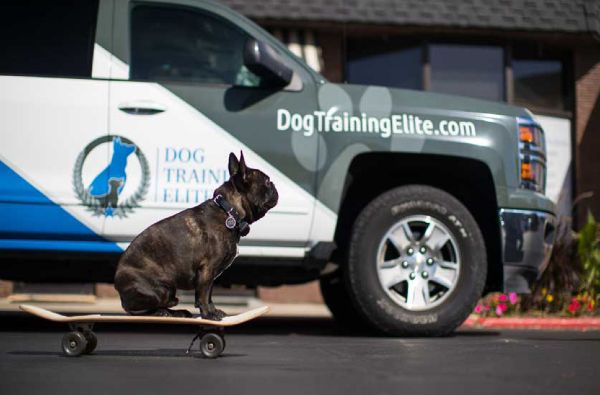
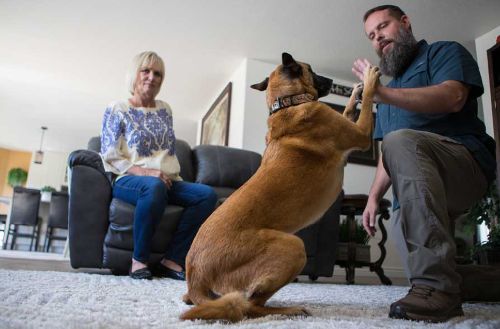
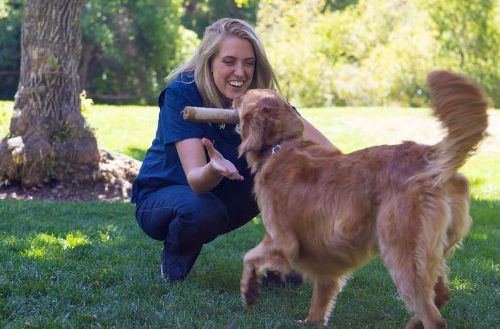

Behavior Training
This type of training aims to correct or rewrite an undesirable behavior. For example, if a dog or puppy whines and cries when the owner leaves the house, the dog may be experiencing separation anxiety and acting out. To fix this behavior, you would need to train this dog to respond differently to being left alone in the house.
With behavior training, the trainer and owner look at the situation that needs addressing, figure out the trigger for the bad behavior, and train the dog to respond differently to that trigger. After consistent training and positive reinforcement, the dog will perform the learned response to the trigger or stimulus even without commands or rewards, essentially rewriting their response to that situation.
Obedience Training
Trainers use obedience training to teach a command and then have a dog obey and perform that command. This training involves teaching a puppy or dog basic commands like “sit,” “come,” “heel,” or “down.” The Dog Training Elite trainers can also use obedience training to teach other commands more unique to your life and situation.
The goal of obedience training is in the name - training a dog to obey commands reliably. Obedience training for dogs can sometimes be lengthy and requires repetition, consistency, and lots of positive reinforcement to achieve lasting results.
When obedience training is employed correctly, it fosters a deep connection between dog and owner that encourages consistent compliance from the dog and positive reinforcement from the owner.
Se habla español!

Our Balanced Theory
We base our training around the "Classical Conditioning" model (a.k.a. "Pavlovian" or "respondent conditioning"). This includes developing conditioned or automatic reflexes to commands. In its simplest form (after proper conditioning), when the owner says "sit," the dog automatically sits without thinking about it. Our unique techniques ensure our program is a success no matter what behavior we encounter.
-
Empowering Owners
We empower Owners to train so their dog knows who to obey at all times. -
Personalized
We deal with problem behaviors on a personal basis. -
Environment Specific
We train wherever issues tend to arise (i.e. jogging, park, home).
-
Supportive
We support Owners in the off-hours (when training is "not in session"). -
Involved
We work with all members of the household. -
Simplified & Customized
We plan training around the owner's schedule and require only 20 min/day follow-up practice.
-
Continued Training
Additional programs / group sessions offered after in-home training. -
Lifetime Investment
We follow up & are invested in the owner's success long-term. -
Satisfaction Ratings
Our high client satisfaction rating sets us apart from competitors.
clas·si·cal con·di·tion·ing
PSYCHOLOGY
noun
A learning process that occurs when two stimuli are repeatedly paired; a response that is at first elicited by the second stimulus and is eventually elicited by the first stimulus alone.
The Dog Training Elite Training Method
Correct responses to a command or rewriting a reaction to a trigger can be accomplished through many methods. Dog Training Elite uses positive reinforcement, or “classical conditioning,” to achieve the desired results. Years of experience have taught us that classical conditioning is the most effective way to train a dog.
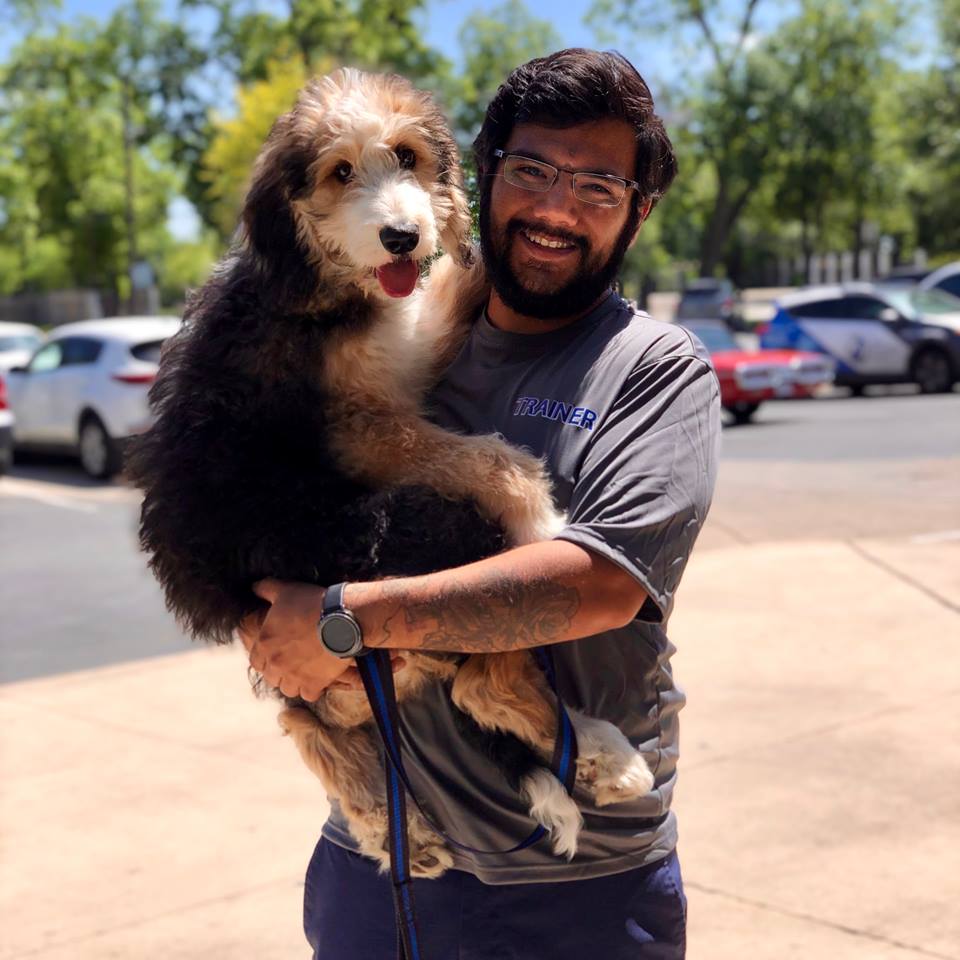
What is classical conditioning?
Also known as the Pavlovian model, classical conditioning refers to a learning process that occurs when you pair two stimuli with a command. Studies have proven that classical conditioning is the preferred training method as it offers long-lasting results and teaches deep-rooted obedience. At Dog Training Elite, an electronic collar and positive reinforcement are the two stimuli we use to teach your dog good behavior. The electronic collar is not a shock collar. Like a clicker device, it gets your dog’s attention during training.
Offering rewards and positive reinforcement will yield positive results and a happy and confident dog. In contrast, using negative reinforcement and punishment will result in a dog performing out of fear and lacking trust and confidence. The trainers in Fort Worth want your dog to be happy and confident and have a deep and lasting connection with you as their owner. That’s why we only use positive reinforcement and classical conditioning.
Se habla español!
Which Training is Right For You and Your Dog?
Dog Training Elite offers behavior and obedience training for dogs, but how do you know which is right for you? Suppose your dog is exhibiting behaviors like biting, excessive barking, digging, or more. In that case, they may benefit from some behavioral training to rewrite those responses. If you have a new puppy or your dog has trouble obeying commands, obedience training is the ideal solution. In some cases, your dog may need a combination of both.
If you're still unsure what training is best for you and your dog, Dog Training Elite is ready to help! Find a trainer near you today to get started on your dog's training journey.
We help your dog become a valued companion and beloved member of the family. Read what our customers have to say and then give us a call!
Felicity and Kyler were great! Our fiesty Doberman Bonnie has a whole lot of attitude and is too smart for her own good. We got the platinum training and started when she was about 4 months old. She is almost 1 and still doing wonderful! We had Felicity for most sessions, which was nice to have that consistency! Bonnie learned so much, and does so well in public. Teaching Bonnie all of her tricks at home alongside a trainer allowed us to be involved and learn how to reestablish behaviors/tricks as needed. Our golden retriever has also been able to pick up many of the skills and that has been a lifesaver. I love being able to walk them both around Scheels and other busy places while they’re in a focused heel. Everyone around us is always so impressed! We are excited to try the group training sessions with Bonnie soon!— Caitlin Goodman
Posted September 20th 2024
The trainers here are so knowledgeable and can read a dogs body language so fast. They taught my dog commands in 5 minutes or less and showed me how to instill those. Highly recommend this place worth every penny. Felicity really knew my dog and went the extra mile with information to help Winnie the Pooh.— Elinor Albin
Posted July 23rd 2024
We love our dog, but he has always been a constant source of stress in our family because of his aggression, his inability to go on walks without creating havoc, and his propensity to run out of the house whenever the door opened up. We finally decided we had to get rid of the dog or get him trained. So we decided to give Dog Training Elite a call. Looking back, it was such a wonderful choice. After six individual training sessions, our dog is extremely well-behaved. He sits on command, he will “place” wherever we tell him to, he’s enjoyable to walk on a leash, he doesn’t attack other dogs or people, and he doesn’t run out of the house. We couldn’t be more pleased with the training staff of Tra, Felicity, and Yuni. The highlight of our experience was when we decided to take our dog with us to a hotel, and then out to dinner. Our son - who was back home from college and wasn’t a part of the training experience -thought we were crazy to even try to take our dog to a hotel and restaurant. But our dog did wonderfully and our son was very impressed with how well behaved the dog was. If you are at your ropes end and want to get your dog under control, give Elite a try… you will start to see immediate and dramatic results!— Jeff Domen
Posted July 19th 2024
The company is great with communication and customer service! Felicity has been an incredible teacher and has helped me and my dog learn so much!— phoebe james
Posted July 18th 2024
Incredible trainers! Felicity did a great job helping my dogs— grant wiseman
Posted July 15th 2024
They have been very understanding and patien I love the system they do the process They really are doing the best job they can Felicity is one of the trainers that we have met she is so amazing she has taught my dog the basics and she did with such patience and I could understand everything she said I'm very excited to see what more they are going to teach my puppy and us They have been clear on everything which I like Overall I give them an amazing review for these reasons— Carol L
Posted July 15th 2024
We were Very satisfied with Dog Training Elite! Our Labrador puppy had the very best training and is now a trained service animal by Dog Training Elite. Most favorite trainer, Felicity, is a True Puppy Whisperer! A rare and greatly appreciated find for our boy! He worships her too! She is always smart, kind and gentle. And extremely effective!— Diana Enty
Posted July 15th 2024
Felicity, is an amazing trainer. She was able to train me so I could better train my boys.She was able to work with both of my boys personalities to bring them to their highest level of training. Thank you Dog Training Elite Dallas, for having the best dog trainers! Mr. Tre, I appreciate your work and service to us VETs and our Service Dogs. I will be forever grateful.— AliDrea Arismendez-Garza
Posted July 15th 2024
The team at Dog Training Elite have absolutely changed our lives. Felicity, Tre, and Kyler are incredibly knowledgeable, patient, and kind. On days when I thought my little rescue, Olive, couldn’t possibly learn a new command, they assured me she absolutely would… and she always did. Olive is a completely different dog from when we first started training. Her confidence has grown exponentially and we’re living a really happy life together. I cant recommend or thank Felicity, Tre, and Kyler enough.— kb B
Posted July 15th 2024
Just completed our in-home sessions with DTE and have been so impressed with the individualized attention and customized approach that helped us meet our goals. All the trainers have been top notch and really helpful in assuring our newest family member (and us) are polished up on our manners so we can enjoy each other and life adventures. I must specifically mention Megan as a trainer whose passion and dedication did not go unnoticed and is deeply appreciated. Mufasa and I are looking forward to our group lessons!— brandi Ciufi
Posted July 1st 2024
We've been working with Dog Training Elite Frisco for almost a year. Kyler and the team have been fantastic to work with in helping train my mom's service dog. Esper is a GSD, and started training as a puppy. She learned her basic obedience quickly with positive reinforcement and the techniques and tools DTE recommended. Quickly moving into her Service and Task training. Now a year later (actually less time) She passed her task training and public access test and goes with us everywhere. She is welcomed at restaurants, grocery stores, department stores, due to her great behavior and provides an invaluable service to my Mom. I highly recommend Dog Training Elite Frisco, Kyler and the team there. Next up is our new 15 week old puppy who will be evaluated soon and start his puppy training.— Forrest Hart
Posted May 15th 2024
Just wanted to say thank you so much for the very kind lady called Kelly. She was really good and patient at teach me and my dog. awesome lady— Darwin araujo
Posted May 14th 2024
loved it. she was so sweet with my dog. this was really good training i definitely recommend!! kelly was such a good trainer my dog is so much better!!— Jalissa Martinez
Posted May 14th 2024
Jordan is patient and calm while training our dog and teaching us what to do. He is great to work with. Lulu learned respect quickly. I would highly recommend him. His dog Atlas was such a sweet dog and very well trained.— Juanita Ace-Bo
Posted July 3rd 2023
We worked with Jordan yesterday and my puppy responded Really well to him and we got lots of great help! Really looking forward to how Clark progresses and to see how the next sessions go.— Laura Riggs
Posted May 6th 2024
We contacted Dog Training Elite to help us with Bean, our not so mini mini dachshund who wasn’t great with new people coming into our home especially men. As we are relocating overseas & only had enough time for 4 sessions, the best we hoped for was great advice that we could take with us & put into practice. 4 sessions later we are delighted not just with the advice but the incredible change in Bean’s behaviour! All we can say is a huge thank you to the team at Dog Training Elite not only for accommodating us with so little time but for setting us up to succeed with Bean. A special thanks to our trainers Kyler & Tra. You guys are amazing! Thank you!!!— Tracey McAdam
Posted April 27th 2024
They staff is AMAZING. Very helpful, and really explains everything. Luke and cowboy has done an amazing job really building a bond!!! I would recommend!!!!— Dkota Gibbs
Posted December 21st 2023
I can’t speak highly enough of this group of trainers! They have been very professional and VERY helpful. Luke is my daughter’s favorite trainer and he does so well with my daughter and her dog. You WILL NOT regret hiring them to train your dog. Highly recommend!!— Tonya Gibbs
Posted December 21st 2023
All the trainers have been great but Luke and Cowboy are absolutely amazing! Our service dog has been very responsive! We have friends who have also utilized this service and love it just as much! Thank you Luke and the Elite team!— Stacey and Josh Glosson
Posted December 20th 2023